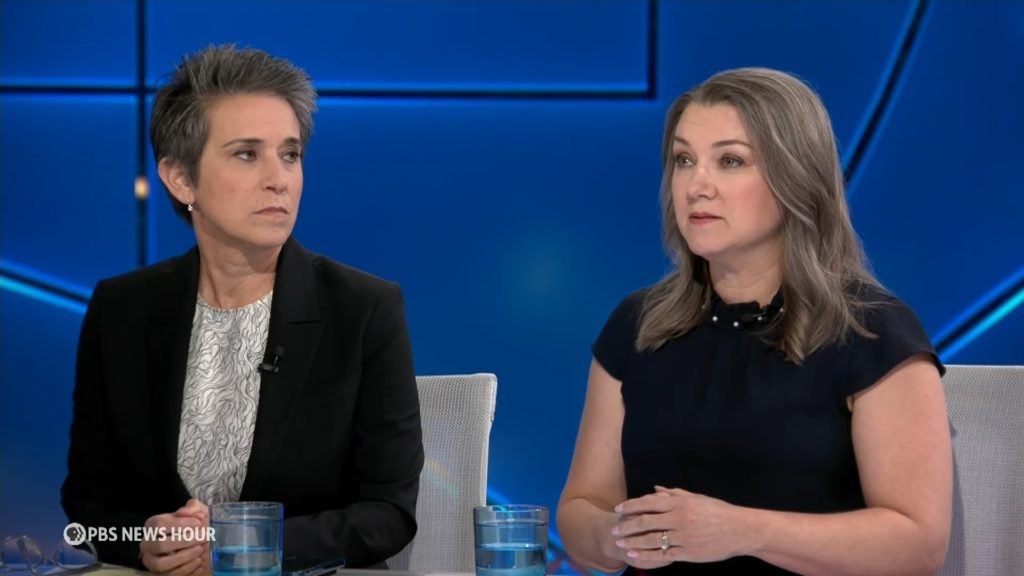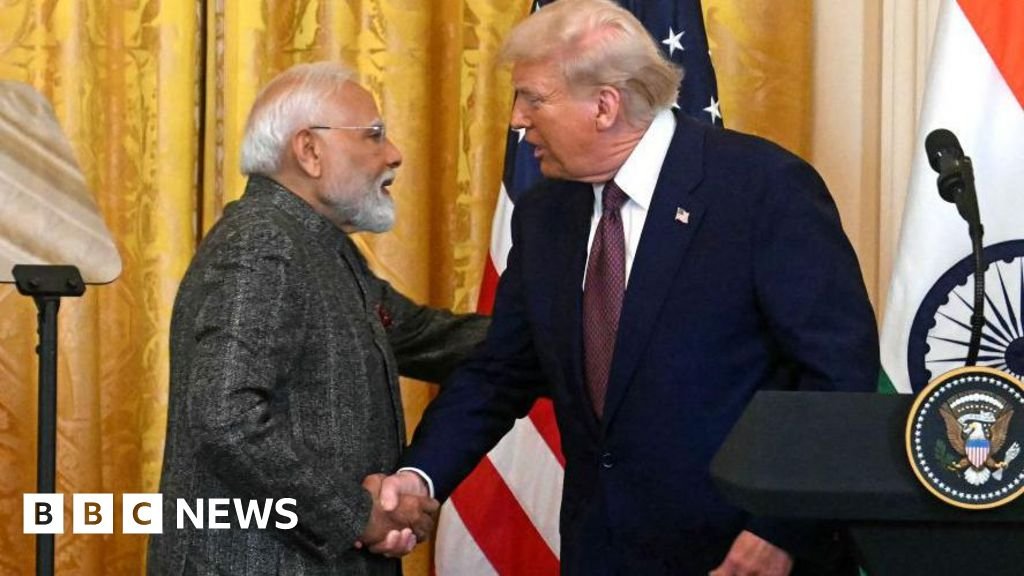Amna Nawaz:
The killing of right-wing activist Charlie Kirk has ignited a political firestorm that only seemed to intensify over the weekend.
For more on that, we turn now to our Politics Monday duo. That is Amy Walter of The Cook Political Report With Amy Walter and Tamara Keith of NPR.
Good to see you both.
Tamara Keith, National Public Radio:
Good to be here.
Amna Nawaz:
As we have reported, as you have seen, since Kirk’s killing, the rhetoric, the finger-pointing have only gotten more intense.
We saw folks like Utah Governor Spencer Cox calling on people to tone it down, but now we have also seen others, including President Trump, for whom Kirk’s death is personal, we should note, who’s been overtly blaming radicals on the left, as he calls it.
Tam, put President Trump’s response to this in the context of past responses that I know you have reported on when it comes to political violence.
Tamara Keith:
Right.
And President Trump has been all over the place in terms of how he responds. You might obviously remember the assassination attempt on him in Butler, Pennsylvania. And after that, a lot of his supporters immediately wanted to blame left-wing rhetoric. And President Trump was more restrained at that time and didn’t really go there. And, ultimately, we found out that the shooter didn’t really have an ideology.
He had President Biden on his potential target list as well. I went back to 2018, and there was a Republican supporter of President Trump who was sending bombs to Democratic lawmakers and also CNN. He was caught. The president praised law enforcement for catching him. But then he immediately turned to criticize the media for trying to say that the actions of one person were somehow — should be blamed on either him or the Republican Party.
Amna Nawaz:
Yes.
Tamara Keith:
He says we did not — he says that doing that, blaming a mass murderer or blaming a crime on an individual or on a party, that would be wrong. Using that for political gain would be wrong. I’m reading this quote horribly. He says that would have been wrong.
But in this case, he is doing the very thing that he criticized the media for doing back in 2018, which is saying that the actions of one person are to be — that an entire party, the entire left-wing ecosystem is to blame for the actions of one person.
We haven’t even seen charging papers yet. It’s not clear precisely — and we may never know entirely because he’s not cooperating — exactly what drove him.
Amna Nawaz:
Yes.
Amy, how do you look at this? And which of these responses is resonating more with Republicans?
Amy Walter, The Cook Political Report:
Yes, well, it seems clear to me that we’re now in this different era. There was a time, at least when I was younger, where, if something like this occurred, if there were an assassination or assassination attempt, everybody knew where to go to get information.
Walter Cronkite was going to be there telling you what the facts were. That doesn’t work that way. And so everybody immediately went into their echo chambers. And so, depending on what you’re watching or what you’re consuming, you are getting a mix of — some of it’s fact, but a lot of conjecture and a lot of opinion.
And so when you say, well, where are the two parties on this, how do they see that, there has been some recent polling. YouGov has been tracking this issue for some time. And you’re not going to be surprised that if you identify as a Democrat, overwhelmingly, you think that Republicans are responsible for the rhetoric and that leads to this violence, and the same if you’re a Republican and you feel that way about Democrats.
Amna Nawaz:
Meanwhile, in this sort of heated environment, Tam, we saw the president today sign a memo in the Oval Office announcing he’s going to be sending the National Guard troops into Memphis, Tennessee. Why now? What signal does this end?
Tamara Keith:
I think the why now is largely because he has support from Tennessee’s governor, who says, come on down. President Trump has been saying that he wants to be invited. He’s been invited.
And the mayor is less excited about this, to say the least. The mayor is a Democrat. But this is forming a task force. So it’s not just the National Guard, which the governor could call up on his own, but he’s also — the president’s also bringing in ATF, FBI, that sort of alphabet soup of federal law enforcement.
And, in fact, the president said that the FBI has been operating in Memphis for some time now leading into this. President Trump has been clear that D.C. was a test case and that he intended to expand it. He is now expanding it. He’s also talking about Chicago, potentially St. Louis. This is not the end. This is just the next step at what the president is making it seem would be the early stages of a plan to target many cities in America.
Amy Walter:
Yes, and it also addresses what many of the critics of the president have said, which is, oh, how come you’re only going to blue states? Well, I’m going to red states. These are — we’re going to — whether it’s Missouri or not, but we’re going to go to Tennessee, which obviously has a Republican governor and..
Amna Nawaz:
A Democratic mayor of Memphis.
Amy Walter:
And a Democratic mayor, absolutely, absolutely.
But it bypasses the challenge that he’s had with blue states, like Governor Newsom in California or Governor Pritzker in Illinois.
Amna Nawaz:
Illinois.
Amy Walter:
The other issue is, it is very clear that Donald Trump would like to make crime and safety the centerpiece of the conversation that we’re having, the political conversation that we’re having, certainly when you look at the midterms.
And it makes some sense. It’s one of the only issues in which the president’s overall approval ratings are higher than his disapproval ratings. If it’s about the economy, that’s very deeply underwater. Even immigration is a little bit — people see him more negatively than positively by a smaller percentage, but still more negatively.
Amna Nawaz:
Meanwhile, as we speak, there’s a potential government shutdown looming in just a matter of weeks, two weeks, to be exact. We know Democrats are trying to learn lessons from the last time they have this go-around how to respond this time.
Tam, what do they think? And do they make a deal? Or do they fight Trump’s agenda and risk a shutdown?
Tamara Keith:
Well, at the moment, first, Republicans need to pass it out of the House. And this has been a challenge in the past, but President Trump went on social media today to say, failure is not an option. Every single Republican needs to vote for what he’s calling a clean continuing resolution.
That is, it would sort of punt the budget from, I don’t know, a year-and-a-half ago, the last time one was actually negotiated and sort of punt that forward for some period of time. The thought that some Democrats are having is, they don’t want to give that away if it gets — assuming it does get to the Senate.
And so one of the ideas that they’re talking about is saying that funding for Obamacare Affordable Care Act subsidies, yes…
Amna Nawaz:
The health care subsidies.
Tamara Keith:
Health care — yes, health care subsidies should be restored. In the One Big Beautiful Bill, those subsidies went away and are otherwise expiring. And so they are highlighting this as a potential place, and some Republicans might support it.
The real issue here is, Democrats — Democratic voters want a fight.
Amy Walter:
Right.
They want the fight, but at the same time, you have to know what your endgame is and what your message is. And so Democrats getting on the same page saying, this is a fight for health care. This is a fight to do this particular issue and then being consistent about that, that is another — going to be another important thing to watch.
Amna Nawaz:
I have a feeling we will be talking about this more…
Amy Walter:
I do too.
Tamara Keith:
I think we will.
Amna Nawaz:
… over the next couple of weeks.
Amy Walter, Tamara Keith, always great to see you. Thank you.
Amy Walter:
You’re welcome.




